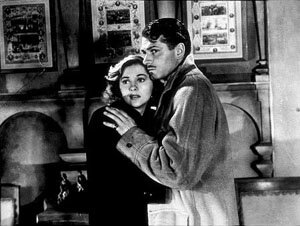Directed by Alfred Hitchcock
In Rebecca we have the least Hitchcock-like of Alfred Hitchcock’s movies and also the only one to win an Oscar. It was his first Hollywood film, made with producer David O. Selznick, with what for Hitchcock was boatloads of money.
So in some ways he indulges himself as a filmmaker but also satisfies Selznick as a producer by making a very commercial movie: a gothic melodrama based on a Daphne du Maurier’s hugely popular book of the same name.
I get the sense a lot of Hitchcock devotees think less highly of Rebecca than some of his movies (as did Hitchcock himself) but perhaps that is because, in the Hitchcock oeuvre, this is the odd one out.
Of the movie, Hitch would say later something akin to, “It has held up well over the years. I don’t know why.” I suspect that was some of his wry humour. I’m pretty sure he knew why. It’s simply an extremely well made movie with a compelling story.
A much more interesting comment Hitchcock makes of Rebecca can be found in his interviews with Truffaut, included as a special feature on the Criterion Collection 2-disc set of the movie.
He refers to it as a 19th century story and, later, says it is about 1910-ish. In other words, it’s an old fashioned story: wealthy aristocrats, poor working girl, romance and so on.
The IMDb description is pretty accurate and succinct: “When a naive young woman marries a rich widower and settles in his gigantic mansion, she finds the memory of the first wife maintaining a grip on her husband and the servants.”
What it doesn’t suggest is the tension and haunting aspect of the story, elements I really love about the movie. It is a very atmospheric, moody film. Most of the shots of the mansion called Manderlay suggest a haunted house.
It is haunted, though not in a supernatural sense. The presence of the former wife, Rebecca, lingers everywhere. In fact, Manderlay and Rebecca are in some ways synonymous and, as such, a major character in the movie.
I’ve always liked the gothic melodrama for its “spooky” quality and so it is no surprise to me that Rebecca is one of my favourite Hitchcock movies.
At the same time, it’s a movie that makes me want to scream in frustration at the screen – specifically at Joan Fontaine’s character, “I.”
(Yes, she has no name beyond that, other than Mrs. De Winter, also Rebecca’s name.)
This is not due to thinking Fontaine gives a poor performance but rather the opposite. Her character is so mousey, has such low self-esteem through so much of the film, I want to grab her and shake sense into her.
Through the majority of the movie her character’s posture is one of slight cowering – the shoulders are rounded down and her head constantly tilts forward as she looks to the floor in gestures of self abnegation. Her lack of esteem invites bullying, which she receives from Judith Anderson’s Mrs. Danvers and, later, to some degree from George Sanders’ Jack Flavell.
Of course, that is a large part of the gothic romance – the naïve woman at its heart being terrorized by things she can’t quite fathom and appears to have no will or strength to combat … until she does.
A few more Rebecca notes … A great cast. Fontaine is perfect, so much so she make me want to tear my hair out. Laurence Olivier is perfect too as the distant, aristocrat widow.
George Sanders is as wicked and caddish as he’s ever been and I don’t know of anyone I’ve seen in any movie ever that was so spine-chillingly cool as Judith Anderson with her stony, indifferent face.
(Hitchcock points out somewhere in the special features that we never see Mrs. Danvers walk into a room. Fontaine may hear a sound or get some inkling and will turn and … there is Mrs. Danvers, as if she appeared out of thin air. It is a little something that adds to her mystery and the feeling of something not quite natural.)
Rebecca is really a ghost story without an actual ghost, not in any literal sense. But that is how and why the film works and probably why I find it so entertaining.

Though it may not be a Hitchcock film as we usually think of his films, there should be enough elements in it to keep his fans engaged.
There is mystery and suspense.
There is Olivier’s Maxim de Winter constantly referring to, and treating, his new wife (Fontaine) as a child, dominating her with a desire to fashion her as he wants her.
And there is Mrs. Danvers loyalty and love of the dead Rebecca that suggests a lesbian affection, though perhaps one not requited.



1 Response